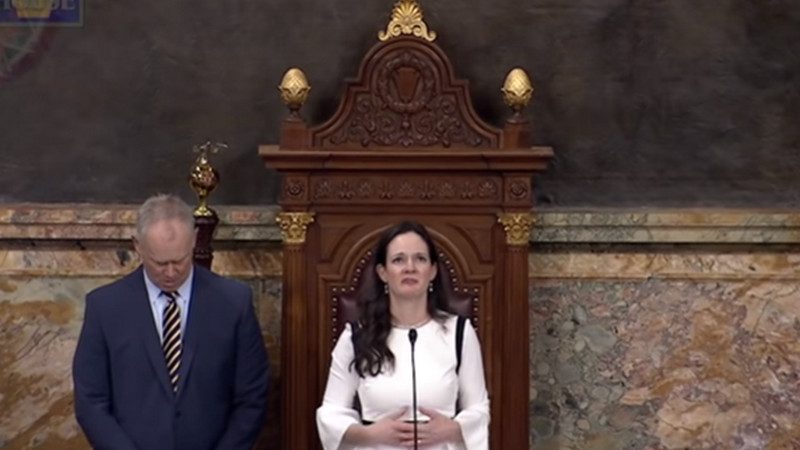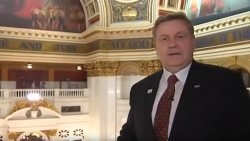Conservative Christians are rallying around Pennsylvania State Rep. Stephanie Borowicz, who has been widely criticized for the sectarian, political, triumphalist prayer she offered last Monday to start a session in which the first Muslim woman elected to the state House was to be sworn in.
Guidelines for legislative prayers in the Pennsylvania House have in the past asked guest chaplains to keep their prayers nonpolitical and respectful of all faiths. Many legislative prayers ask God to give lawmakers wisdom while carrying out the people’s business. An atheist has even offered prayers in the state Senate, but House Speaker Mike Turzai is appealing a court ruling that he allow non-theists to serve as guest chaplains. Meanwhile, representatives are offering opening prayers.
“God, forgive us,” Borowicz prayed. “Jesus we’ve lost sight of you. We’ve forgotten you, God, and our country. And we’re asking you to forgive us, Jesus …” She ended her prayer using language drawn from the Bible, proclaiming that “every knee will bow and every tongue will confess, Jesus, that you are Lord.”
That prayer, which also offered thanks that President Trump “stands beside Israel unequivocally,” was particularly provocative, coming as it did just before the swearing-in of Movita Johnson-Harrell, a Muslim woman who recently won a special election.
House Democratic Whip Jordan Harris was among the critics, saying that Borowicz had “weaponized” prayer.
Borowicz is unapologetic and, like many of her supporters, has sought to frame the issue not as a controversy over the appropriateness of her prayer in the context she delivered it, but as an example of anti-Christian persecution. In a written statement, Borowicz said, “If a lawmaker who is a Christian can no longer stand in a general assembly in America — when there are Bible verses inscribed all throughout our beautiful state Capitol — and pray to Jesus without ridicule, then we are no longer free.”
Other Christian conservatives are also characterizing criticism of her prayer as an example of anti-Christian persecution, claiming that Borowicz’s critics are trying to silence her. At the Christian Post, Jeffrey Trimbath, executive director of the Center for Vision & Values at the conservative Christian Grove City College, decried what he called the “faith-shaming” of Borowicz, saying [[and said]] that her critics were “trying to censor religious speech under the veil of ‘taking offense.’”
A Charisma article entitled “Politician Under Attack After Proclaiming Prophetic Promises in Powerful Prayer” said “the left is attacking Borowicz.” A LifeSiteNews contributor said Borowicz is being “persecuted for praying to Jesus.”
A Christian Broadcasting Network story with the headline “A Tale of Two Prayers in PA State House: ‘Jesus’ Prayer Blasted as ‘Islamophobic’, Quran Prayer Applauded” quoted Republican Rep. Daryl Metcalfe saying that for Johnson-Harrell to “attack” Borowicz and call her prayer an example of Islamophobia “should be offensive to every Pennsylvanian.”
Todd Starnes, always ready to hype threats of Christian persecution in America, had Borowicz on his radio show. Starnes played a clip of the final “every knee shall bow” section of her prayer, adding his own “Amen.” He called it “a mighty terrific prayer” and called criticism of her “despicable.” Starnes said that “religious liberty is under attack” and that people are “actively trying to silence the Christian voice in America.”
American Pastors Network’s Sam Rohrer had Borowicz on his “Stand in the Gap” program on Thursday as part of a segment on “American Exceptionalism.” She said the prayer reflected her passions: “Jesus, our nation, our freedoms, our liberties, because those come through Jesus.” Asked why she thought the prayer had caused such controversy, she said, “You know, I think that there’s power, Sam, in the name of Jesus, and it’s been a while maybe since somebody stood up and prayed in the authority and power of Jesus’s name.” Rohrer’s colleague Gary Dull, executive director of the Pennsylvania Pastors Network, was among the Borowicz supporters who suggested that objections to the prayer were raised simply because it was Christian.
Franklin Graham also posted a defense of Borowicz, writing “God bless her for her boldness,” and, “I always appreciate anyone who has the guts to stand up for Jesus.” She cited Graham’s support while on both Starnes’ and Rohrer’s shows. “I stand for Jesus no matter what and no matter who I’m in front of,” whether she’s in front of her church or somewhere else, she said.
But that’s precisely the critics’ point—standing in front of the legislature is not the same thing as standing in front of a church. As the Philadelphia Inquirer’s editorial board has noted, her prayer would have been perfectly appropriate from a church pulpit, but “not for the podium in the state house.” More from Monday’s editorial, which suggested rethinking the custom of legislative prayers in an increasingly pluralistic country:
Elected officials or even clergy who are given the privilege of offering an invocation at a secular public event no longer have the privilege of assuming their audience shares their faith tradition, or any faith tradition. Muslims, Hindus, Buddhists, and practitioners of Native American or new-age spiritual rites are likely to be seated among the atheists, agnostics, Orthodox Jews, secular Jews, and Catholics who share the rows with evangelical and mainline Christians of many descriptions.
Borowicz probably didn’t intend it, but her over-the-top performance underscored the risk of enshrining religious expression at ceremonial occasions, and especially in public settings that are inherently political. Her mixing of allusions to Jesus with references to President Trump, surely among the least pious politicians imaginable, gave her invocation an unwelcome partisan cast.
Solemn public occasions deserve better, particularly those financed by the taxpayers. A prayer is inherently a form of religious expression, so a moment of silence, rather than “silent prayer” or “moment of reflection,” to name two popular variables, would create space for believers and nonbelievers alike to participate in the camaraderie and community such occasions promise.
Rethinking this custom in no way requires anyone to compromise spiritual beliefs. Rather, it’s an opportunity to avoid disrespecting religion — and politics, too, for that matter — by confusing a house of government with a house of worship.
Journalist and scholar Mark Silk, in a Religion News Service column that included an annotated version of Borowicz’s prayer, described it as going beyond praying in Jesus’ name—he called it “witnessing.” Silk, who also corrected some of Borowicz’s history, noted that she did not even give a nod to the country’s religious pluralism. “Forgive her,” he wrote, “for she does not know what her country is about.”
Writing about the episode for a Christian website, Canadian religious studies professor John Stackhouse titled his essay, “The Perils of Public Prayer.” Stackhouse, an opponent of prayer at official government events, argues that if you accept an invitation to pray at such an event, you should not use it for political advantage or to thumb your nose at your opponents. “It’s profaning the sacred,” he says. “It’s certainly not loving your neighbor as you love yourself.”
Johnson-Harrell, the lawmaker whose swearing-in became entangled with the coverage of Borowicz’s prayer, said on Tuesday, “I do not have a problem with religion. I do not have a problem with choice. I do not have a problem with Jesus. I have a problem with using religion as a weapon.”
Johnson-Harrell said that prayer to open the legislative session is meant to be inclusive and bring everyone together. “We as Republicans and Democrats can find many, many things to fight about,” she said. “Prayer shouldn’t be one of them.”








